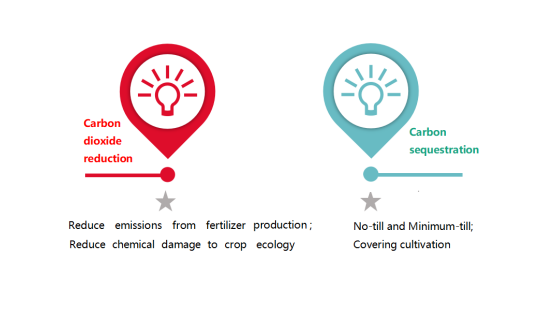
Exhibition time: 17-19 March, 2026 Shanghai, China
 中文
中文

Exhibition time: 17-19 March, 2026 Shanghai, China
 中文
中文
Key words of the passage: organic; carbon; sequestration; climate
Under global climate change, the development of low-carbon agriculture with low emission and low energy consumption has gradually become an important way to reduce greenhouse gas emissions. Organic farming is one of the several major low-carbon farming models, which strictly follows the production standard of organic farming without using genetically engineered organisms and products. Organic farming stresses on regulating the balance between plants and soil through ecological criteria and natural law.
The Intergovernmental Panel on Climate Change (IPCC) of the United Nations has clearly expressed that nearly 90% of farming emission could be reduced through soil carbon sequestration. This is the logic of organic farming, as based upon low-carbon agriculture.

The effect of emission reduction of organic farming
Greenhouse gases in farmlands mainly include CO2, CH4 and N2O. One of the principles of organic farming is to reduce the use of non-renewable resources. Agricultural CO2 sources originate mainly from direct emissions of combustion of fossil fuels and indirect energy consumption. The synthesis of chemical nitrogen fertilizers alone emits CO2 as high as 0.4-0.6 Gt, equivalent to 10% of the direct agricultural emissions. Organic farming prohibits chemical fertilizers and pesticides, which significantly reduces energy consumption over conventional farming.
The emission of CH4 in the agricultural planting process mainly comes from rice farming and the decomposition of wastes, while the emission of agricultural N2O mainly comes from applying nitrogen fertilizer. In China, the utilization of chemical nitrogen fertilizer in agricultural cultivation is on the low side. In case of an increase in the application of chemical nitrogen fertilizer, the emission of soil N2O will increase. In organic farming, what is used is organic fertilizer or biological fertilizer that can be efficiently utilized by the soil, thus reducing greenhouse gas emissions while improving soil biological activity. For example, the organic farming of winter wheat is reported to emit 46%-57% less CO2 over conventional farming, whilst organic growing of potato reduces emission of CO2 by 13%-33%. In addition, organic farming promotes resource recycling, like the most basic straw manuring, which reduces CO2 emission to a large extent.
The diversity of soil plays a vital role in improving photosynthesis and growth of plants, whilst synthetic chemicals such as insecticides and herbicides are destructive to the microorganism in soil. On the other hand, the use of chemical fertilizers harms the growth of rhizomes of most plants, which significantly weakens the root growth of plants. As fertilizer is concentrated in the shallow layer of soil, nutrients cannot be passed on to the deep layer of soil.
Effect of carbon sequestration on organic farming
To reduce greenhouse gas emission from farming, the most important way is to improve the soil’s carbon sequestration capacity to increase soil carbon sink. The most apparent difference between organic farming and conventional farming lies in the increase of organic matter because organic cultivation introduces a large amount of animal and plant residues which would increase the source of carbon. Meanwhile, the organic management model can effectively reduce carbon decomposition. On can maintain a relatively stable organic carbon pool under such a “high input, low decomposition” model.
Pimentel, the British soil expert, has conducted trials for 22 years, and his results have revealed 15%-28% increase in organic carbon content, while conventional planting has shown an increase of only 9%. Swiss experts have done trials for 21 years, and their results have shown a more stable carbon content in the soil under organic management, whilst the carbon content under conventional management has decreased even by 15%. A comparative study of 35 groups of samples of organic farming versus conventional farming in the central United States also proves that carbon content in the soil under organic management is higher than that under conventional management.
For organic growers, less tillage is one of the most challenging ways to rebuild the soil’s carbon sequestration capacity. As organic growers don’t use chemicals such as herbicides, tillage becomes the primary means of regulating weeds. Frequent tilling has the following negative impacts:
The first, frequent tilling, exposes soil to air, leading to the oxidation of certain amount of carbon in the soil.
The second, tillage may destroy the hyphae of mycorrhiza fungi, which is a plant’s symbiotic microorganism critical to the growth of the root system of plants as it can increase the secretion of related organic matter. Hyphae will form a delicate mesh that gets through the soil to transport water and nutrients to the roots of plants. Studies show an increase in the microbial biomass in all areas where tillage is reduced.
The third, composite soil aggregates accumulated upon microbial secretion may be destructed by tillage, knowing that these aggregates can protect necessary chemical conversions such as nitrogen fixation and carbon stabilization.
The fourth, tilling destroys soil pore space, which is essential for soil water and air conservancy, providing conditions to maintain microorganism activity. Lastly, tilling itself involves machinery running on fossil fuels, which releases large amounts of greenhouse gases during operation.
Covering cultivation is an essential way of controling weeds and accumulating soil carbon in organic farming. The ideal cover crops can be killed due to external reasons such as frosting, harvesting, and crushing before flowering. While these cover crops are alive, photosynthesis is an essential source of soil carbon; after cover crops die out, the biomass contained in plants will play an important role. Among the mixed cover crops, leguminous plants are an important crop variety which are deep-rooted plants capable of transporting nutrients to the deep layer of soil. Meanwhile, leguminous plants get nitrogen and carbon sequestrated in the shallow layer of the soil.
In 2007, the Swiss Research Institute of Organic Agriculture (FiBL), in cooperation with other agencies, launched the study program “Long-term farming systems comparisons in the tropics” (SysCom). It aimed to explore how to make organic farming profitable in a tropic area while contributing to sustainable development and carbon reduction. In April 2021, the study of “Long-term farming systems comparisons in the tropics” conducted by FiBL and its partners in Kenya, India and Bolivia revealed the potential of profitability and increase of productivity of organic farming as same as that of other ways of production, showing that a well-managed organic farming system can improve soil fertility, reduce pesticide residues, and improve biodiversity.
Christina Blank of the Swiss Agency for Development and Cooperation (SDC) commented, “The study provides important information to understand whether and how organic agriculture can contribute to the 2030 Agenda for Sustainable Development to end hunger, poverty and other deprivations.” Dr Noah Adamtey, country coordinator of SysCom Kenya, said: “We found that organic systems can build up soil fertility over the long-term if managed well – that is especially for Africa key to increase productivity and enable food security.”
Climate change and carbon reduction have become a worldwide hot topic. Carbon reduction, low-carbon development and biodiversity protection are the main countermeasures to mitigate and adapt to climate change. Organic farming has distinctive advantages in increasing soil carbon sink, protecting biodiversity and maintaining the eco-balance, facilitating adaptation to extreme climatic conditions such as drought and flooding. What are your thoughts on the role of organic farming in global agricultural carbon reduction? AgroPages is looking forward to hearing from you.
Source: AgroPages
